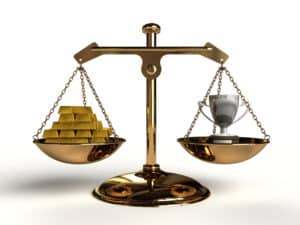Fort Knox is an army base in Kentucky that is next to the U.S. Bullion Depository, so they are often referred to by the same name. It is home to the majority of the U.S. gold supply, but the public doesn’t know the exact amount of gold stored there or its value, as it is closed to visitors. A recent proposed audit of the Fort Knox gold may impact the U.S. economy and lead to effects on gold prices and availability. Noble Gold Investments explores the Fort Knox gold audit discovery and how the U.S. economy and gold market may be impacted.
About the Gold Reserves at Fort Knox
The Fort Knox Bullion Depository is a fortified vault that was established in 1937 and is operated by the United States Department of the Treasury. It has been used continuously since its founding to store most of the U.S. supply of gold. Estimates by U.S. Mint website state that Fort Knox holds around 147 million ounces of gold, with a value of nearly $426 billion based on current market values.
The gold in Fort Knox is constantly being moved and used for different purposes, with some on loan to other countries. Other gold from the reserves is used to make coins, like the American Eagle Gold Coins, which are sold to the public.
Fort Knox is closed to visitors, so many people are skeptical if the reserves are actually filled with the stated amount of gold. This skepticism is mainly due to the guarded nature of the gold reserves, as well as conspiracy theories that have emerged over the past two decades.
Traditionally, the U.S. government wouldn’t allow an audit of the Fort Knox gold. However, President Donald Trump and the head of Department of Government Efficiency (DOGE), Elon Musk, have recently planned a visit to the Fort Knox Bullion Depository. Musk has showed interest in DOGE performing an audit of America’s gold reserves at Fort Knox. This audit has not yet been approved or scheduled, and it would be a massive undertaking due to the sheer amount of purported gold.
Why Is an Audit on Fort Knox Gold Important?
The last-known full audit of Fort Knox’s gold supply happened in 1953, with a partial review done in 1974. Proponents of an audit on the U.S. gold reserves at Fort Knox believe it would increase government transparency. Although the U.S. Department of the Treasury asserts that the gold reserves remain intact, the lack of recent independent audits has led to speculation and skepticism.
While the proposed audit has not yet been approved, many citizens believe it’s important to increase accountability and transparency of the government. Others think an audit can pressure the Federal Reserve (Fed) and U.S. Treasury to consider the role gold plays in our national financial strategy and monetary policy. Some financial experts also forecast that the absence of transparency surrounding Fort Knox can decrease confidence in the U.S. gold reserves, which can affect the gold market as a whole.
How Would a Fort Knox Audit be Completed?
Although a Fort Knox audit has been proposed by President Trump and Elon Musk, it has not been scheduled or approved. Musk hasn’t offered any specifics on how DOGE would perform the audit or whether the department would need government approval.
To audit the U.S. gold reserves would be a massive job that would take a long time to complete (estimated around two years). The amount of gold that is estimated to be in the depository is more than 5,000 tons of gold. The auditing process would require several steps to be thorough and accurate, which may include:
- Receiving authorization (if required) and getting a cleared team together
- Organizing inventory records and understanding storage methods
- Determining proper recording procedures
- Removing each gold bar, inspecting it, weighing it, and recording its findings
- Checking bars with discrepancies in weight or purity
- Processing the data and performing quality assurance checks
This process may vary, but it provides a general idea of how DOGE or the Department of the Treasury would complete an audit.
Potential Impacts of a Fort Knox Audit
According to the World Gold Council, the U.S. has the largest gold reserves in the world. Some people believe that the audit would discover this is false, and the U.S. does not have as much gold stored as they say. Whether or not the number is found to be accurate, an audit of Fort Knox gold reserves can have several impacts on the U.S. economy and the price of gold. They include:
Effects on Market Stability and Confidence
The market effects that occur due to the audit will depend on whether the estimated gold number is found to be precise or inflated. The idea that Fort Knox holds the largest gold reserves in the world helps people have confidence in the U.S. financial system. If the gold reserve estimate is accurate, people will have boosted confidence in the country’s finances, which will lead to market stability. On the other hand, if the value of the gold is found to be less than stated, economists believe it will lead to decreased confidence in the financial system of the U.S. This may send ripple effects through global financial markets since many countries depend on the U.S. for gold loans.
Impacts on the U.S. Dollar
Up until 1933, the U.S. dollar was backed by gold. Citizens could have their dollars converted directly to gold at a fixed value until 1971. Although this gold standard is no longer the case, the assumed value of the U.S. gold reserves provides a feeling of stability for American citizens and foreign markets. If the reserves are audited and found to contain less gold than presumed, the confidence in the dollar could decrease and result in depreciation. This can lead to several detrimental market effects, including making U.S. imports more expensive, contributing to inflation, and increasing competitiveness in exports. These factors can all attribute to economic uncertainty or volatility.
However, if the audit shows the expected amount of gold in the reserves, the U.S. Treasury could perform the revaluation of gold at modern market prices. This could support the value of the U.S. dollar and boost economic stability.
Increased Gold Prices
Gold prices have been increasing steadily as inflation, geopolitical tensions, and central bank purchases also continue to rise. Some analysts predict that gold prices could soon rise over $3,000 per ounce, especially since the announcement of a potential Fort Knox audit. If investors and central banks have doubts about the amount of gold in the U.S. reserves, they may increase their demand for gold, which can lead to soaring prices.
If an audit was performed and confirmed the amount of gold in the reserves, it could result in renewed interest in gold as a valuable asset and increase investor confidence, boosting the price of gold even further. If the audit revealed mismanagement or discrepancies in the amount of gold in the reserves, it could potentially cause a sharp decrease in the price of gold as investor confidence declines.
Geopolitical Effects
If the Fort Knox audit found less gold than expected, geopolitical effects may occur. The global standing of the U.S. and their bargaining power would be decreased. Countries like Russia and China, which have been increasing their gold reserves, could take advantage of this to promote financial systems that aren’t as reliant on U.S. influence.
What an Audit Means for Precious Metal Investors
Investors in precious metals like gold may be curious about what effects a Fort Knox audit can have on their investments. A Fort Knox audit can introduce both opportunities and risks for precious metals investors, as gold’s price and value may skyrocket or decline based on what the audit finds. Until the audit happens, it’s hard to know what will happen. In the meantime, there are several investment strategies that you can consider to help safeguard your current assets and future investments. They include:
- Increase gold holdings: If the Treasury decides to revalue the gold in the reserves, investors can take advantage of the price appreciation by increasing their gold holdings and investments.
- Diversify with other precious metals: If gold prices begin to rise sharply, other precious metals like silver, platinum, and palladium could also see a boost in demand.
- Watch for government announcements: It’s smart to monitor government announcements, policy changes, and audit information to research how it may affect gold prices and demand.
- Open a gold/silver IRA: A gold or silver IRA is a tax-advantaged investment account that allows you to invest in physical gold and other precious metals. This can help you diversify your portfolio, hedge against inflation, and protect your wealth.
- Think long-term: When investing in precious metals, you should think about your investment in the long-term of decades, not years or months. This helps decrease worry over fluctuating markets, prices, and inflation rates.
By considering these investment strategies, you can help your precious metal investments stay secure and valuable. If you haven’t yet invested in precious metals, consider doing so now. Investing in gold can be a smarter choice than investing in cryptocurrency like Bitcoin, which is highly volatile. Crypto investors can benefit from adding gold, which has a high liquidity, to their portfolios.
Turn to Noble Gold Investments for Gold Investing
If you want to get ahead of the Fort Knox audit and the resulting changes in the gold market, contact Noble Gold Investments today. We offer gold and silver IRAs, along with the ability to purchase precious metals and get them delivered to your home. Our knowledgeable team members also provide support throughout the investment process. To get started or learn more, contact us at Noble Gold Investments today.







